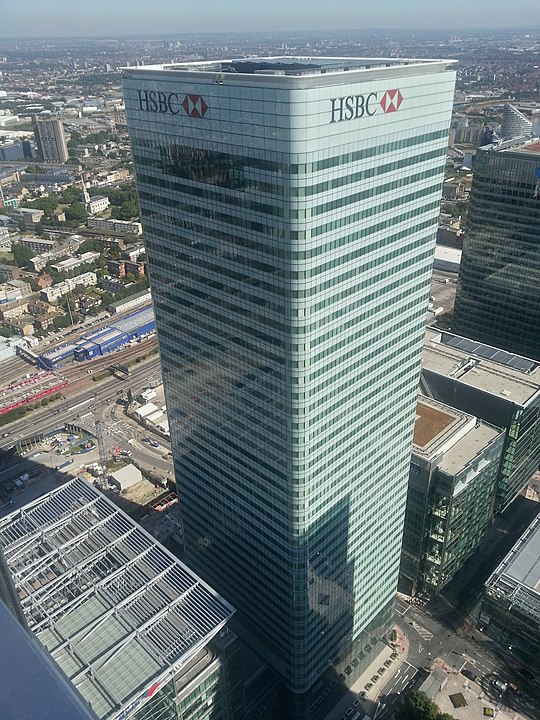In a significant operational overhaul, HSBC is primed to bid farewell to its towering 45-story Canary Wharf headquarters, eyeing a potential move back to its original home, the City of London. This monumental shift is set to take place by 2027, marking the end of HSBC’s two-decade-long occupancy at 8 Canada Square.

HSBC Building, 8 Canada Square, Canary Wharf, London, UK – Credit: Danesman1, own work, CC BY-SA 3.0, commons.wikimedia.org
This strategic relocation is part of HSBC’s larger vision to minimize its office footprint, a transformative response to the new norms ushered in by the Covid-19 pandemic. With a new era of work on the horizon, HSBC is embracing flexible working models, demonstrating a transformative approach to the post-pandemic business environment.
The banking giant revealed to the BBC that discussions are underway to secure a new lease on BT’s former headquarters, located near St Paul’s Cathedral.
The proposed site will house a significantly smaller workforce compared to the 8,000-strong personnel currently stationed at HSBC’s existing headquarters. However, this is also in alignment with HSBC’s redefined focus on sustainable operations. The banking giant was quoted by the BBC as saying the new office would “support digital innovation” and help it meet ESG commitments.
HSBC had migrated to Canary Wharf in 2002, leaving behind a long-standing presence in the City of London. Its potential return to the Square Mile has been welcomed as a “resounding endorsement of the City” by Chris Hayward, the City of London Corporation’s Policy Chairman. He said that the City retains its position as an unparalleled hub for financial services, offering unmatched opportunities.
In the aftermath of the pandemic, HSBC had announced a significant downsizing of its office spaces globally by approximately 40%, in a bid to cut costs, conserve energy, and accommodate increased remote work arrangements. According to HSBC’s Chief Executive Noel Quinn, the traditional five-day office schedule is “unnecessary,” with many managers regularly commuting across the globe.
The forthcoming headquarters is projected to serve as a catalyst for “digital innovation,” while simultaneously aligning HSBC with its net-zero carbon commitments. The future of the current HSBC tower, presently owned by Qatari investors, is yet to be determined.
Regardless of HSBC’s impending move, Canary Wharf Group remains optimistic about the area’s rising diversity, noting an increase in the influx of life science and healthcare companies, alongside a thriving residential community of over 3,500 occupants in rent-to-build apartments.
Opinion: A Watershed Moment Signifying the End of an Era and the Dawn of a New Business Paradigm
As we bear witness to HSBC’s decision to relocate its global headquarters from Canary Wharf to the City of London, we’re reminded of the profound impact the Covid-19 pandemic has had on our lives, and more specifically, on the business world.
Andrew Mawson, managing director of workplace consultancy AWA, was quoted by The Guardian as saying:
“The world will become divided between enlightened employers embracing new ways of working to be more efficient and ditch expensive real estate, and the old command and control bosses mandating staff to be in the office the majority of the time whether it makes sense for them or not.”
HSBC’s planned move is not just a geographical shift; it’s a vivid reflection of an evolving corporate culture, one that prioritizes flexibility, sustainability, and innovation above all. It marks the end of an era defined by towering office skyscrapers filled to the brim with employees working traditional 9-to-5 schedules.
Does the move signal the dawning of a new age, one where the rigidity of office life is exchanged for the fluidity of remote work and flexible schedules, where sustainability isn’t just a buzzword, but an operational imperative, and where digital innovation isn’t a luxury, but a necessity?
Bank Junction, City of London – Credit: The wub, Own work, CC BY-SA 4.0, commons.wikimedia.org
Then again, HSBC’s decision is also a testament to the City of London’s enduring allure. Despite the seismic changes in the business landscape, the City remains an attractive hub for financial services firms, a beacon of opportunity in an ocean of uncertainty.
All in all, the move showcases the resilience of businesses to adapt and transform. HSBC’s downsizing reflects a new business model that aligns with the realities of our time. In an era where remote work and digital platforms reign supreme, businesses no longer need expansive, towering office spaces to thrive.
The departure from Canary Wharf, a symbol of HSBC’s past, will no doubt bring nostalgic sentiment to many. But the bank’s new home in the City of London represents a fresh, albeit familiar chapter in HSBC’s storied history. It promises a future where businesses operate with a greater focus on the well-being of employees and sustainable practices.
This move should serve as a wake-up call for other businesses, a lesson that adaptation is not just about survival, but about forging a path towards a more sustainable, flexible, and innovative future. It’s not just about where we work; it’s about how we work, and most importantly, why we work the way we do.
As HSBC redefines its operational model, it offers a roadmap for others to follow, setting a new standard for what the future of work could and should look like. In this light, HSBC’s move marks not just the end of an era, but more importantly, the beginning of a new one.
